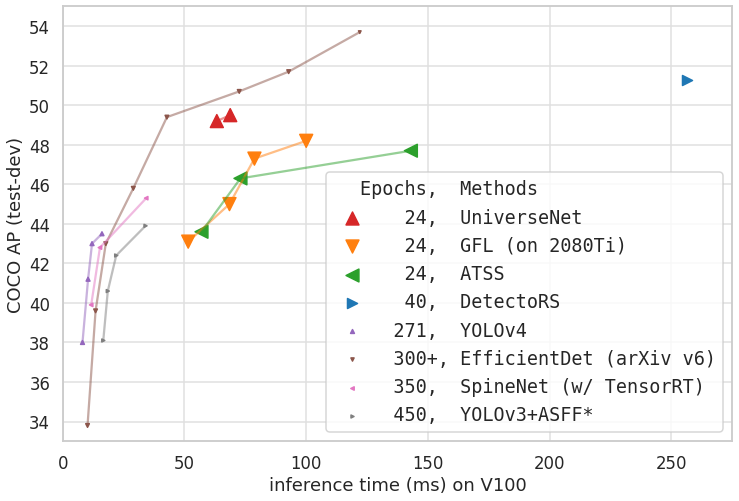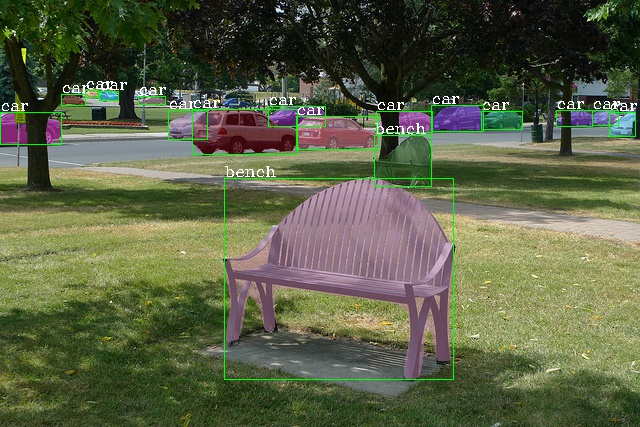UniverseNet is the state-of-the-art detector that can be trained in 24 epochs.
UniverseNet 20.08d (Res2Net-101) is further accurate (54.1 with TTA, 51.3 without TTA).
Concepts:
- Universal scale detection
- Universal training settings (standard hyperparameters)
- Universal Background Model (base model to be transferred)
- 20.12 (Dec. 2020):
- Add configs for Manga109-s dataset
- Add ATSS-style TTA for SOTA accuracy (COCO test-dev AP 54.1)
- Add UniverseNet 20.08s for realtime speed (> 30 fps)
- 20.10 (Oct. 2020):
- Add variants of UniverseNet 20.08
- Update and fix codes for PyTorch 1.6.0, mmdet 2.4.0, mmcv-full 1.1.2
- 20.08 (Aug. 2020): UniverseNet 20.08
- Improve usage of batchnorm
- Use DCN modestly by default for faster training and inference
- 20.07 (July 2020): UniverseNet+GFL
- Add GFL to improve accuracy and speed
- Provide stronger pre-trained model (backbone: Res2Net-101)
- 20.06 (June 2020): UniverseNet
- Achieve SOTA single-stage detector on Waymo Open Dataset 2D detection
- Win 1st place in NightOwls Detection Challenge 2020 all objects track
- UniverseNet
- SEPC
- ATSS+SEPC, GFL+SEPC
-
Test-time augmentation for ATSS and GFLmerged - Classification weights rearrangement
- Waymo Open Dataset
- Waymo Open Dataset configs
- Manga109-s dataset configs
- NightOwls dataset
- NightOwls dataset configs
Some codes are modified from the repositories of SEPC and NightOwls. When merging, please note that there are some minor differences from the above repositories and the original MMDetection repository.
News: We released the technical report on ArXiv.
Documentation: https://mmdetection.readthedocs.io/
MMDetection is an open source object detection toolbox based on PyTorch. It is a part of the OpenMMLab project developed by Multimedia Laboratory, CUHK.
The master branch works with PyTorch 1.3 to 1.6. The old v1.x branch works with PyTorch 1.1 to 1.4, but v2.0 is strongly recommended for faster speed, higher performance, better design and more friendly usage.
-
Modular Design
We decompose the detection framework into different components and one can easily construct a customized object detection framework by combining different modules.
-
Support of multiple frameworks out of box
The toolbox directly supports popular and contemporary detection frameworks, e.g. Faster RCNN, Mask RCNN, RetinaNet, etc.
-
High efficiency
All basic bbox and mask operations run on GPUs. The training speed is faster than or comparable to other codebases, including Detectron2, maskrcnn-benchmark and SimpleDet.
-
State of the art
The toolbox stems from the codebase developed by the MMDet team, who won COCO Detection Challenge in 2018, and we keep pushing it forward.
Apart from MMDetection, we also released a library mmcv for computer vision research, which is heavily depended on by this toolbox.
This project is released under the Apache 2.0 license.
v2.4.0 was released in 5/9/2020. Please refer to changelog.md for details and release history. A comparison between v1.x and v2.0 codebases can be found in compatibility.md.
Results and models are available in the model zoo.
Supported backbones:
- ResNet
- ResNeXt
- VGG
- HRNet
- RegNet
- Res2Net
Supported methods:
- RPN
- Fast R-CNN
- Faster R-CNN
- Mask R-CNN
- Cascade R-CNN
- Cascade Mask R-CNN
- SSD
- RetinaNet
- GHM
- Mask Scoring R-CNN
- Double-Head R-CNN
- Hybrid Task Cascade
- Libra R-CNN
- Guided Anchoring
- FCOS
- RepPoints
- Foveabox
- FreeAnchor
- NAS-FPN
- ATSS
- FSAF
- PAFPN
- Dynamic R-CNN
- PointRend
- CARAFE
- DCNv2
- Group Normalization
- Weight Standardization
- OHEM
- Soft-NMS
- Generalized Attention
- GCNet
- Mixed Precision (FP16) Training
- InstaBoost
- GRoIE
- DetectoRS
- Generalized Focal Loss
- CornerNet
- Side-Aware Boundary Localization
- YOLOv3
- PAA
Some other methods are also supported in projects using MMDetection.
Please refer to install.md for installation and dataset preparation.
Please see getting_started.md for the basic usage of MMDetection. We provide colab tutorial for beginners. There are also tutorials for finetuning models, adding new dataset, designing data pipeline, and adding new modules.
For trouble shooting, please refer to trouble_shooting.md
We appreciate all contributions to improve MMDetection. Please refer to CONTRIBUTING.md for the contributing guideline.
MMDetection is an open source project that is contributed by researchers and engineers from various colleges and companies. We appreciate all the contributors who implement their methods or add new features, as well as users who give valuable feedbacks. We wish that the toolbox and benchmark could serve the growing research community by providing a flexible toolkit to reimplement existing methods and develop their own new detectors.
If you use this toolbox or benchmark in your research, please cite this project.
@article{mmdetection,
title = {{MMDetection}: Open MMLab Detection Toolbox and Benchmark},
author = {Chen, Kai and Wang, Jiaqi and Pang, Jiangmiao and Cao, Yuhang and
Xiong, Yu and Li, Xiaoxiao and Sun, Shuyang and Feng, Wansen and
Liu, Ziwei and Xu, Jiarui and Zhang, Zheng and Cheng, Dazhi and
Zhu, Chenchen and Cheng, Tianheng and Zhao, Qijie and Li, Buyu and
Lu, Xin and Zhu, Rui and Wu, Yue and Dai, Jifeng and Wang, Jingdong
and Shi, Jianping and Ouyang, Wanli and Loy, Chen Change and Lin, Dahua},
journal= {arXiv preprint arXiv:1906.07155},
year={2019}
}
This repo is currently maintained by Kai Chen (@hellock), Yuhang Cao (@yhcao6), Wenwei Zhang (@ZwwWayne), Jiarui Xu (@xvjiarui). Other core developers include Jiangmiao Pang (@OceanPang) and Jiaqi Wang (@myownskyW7).


